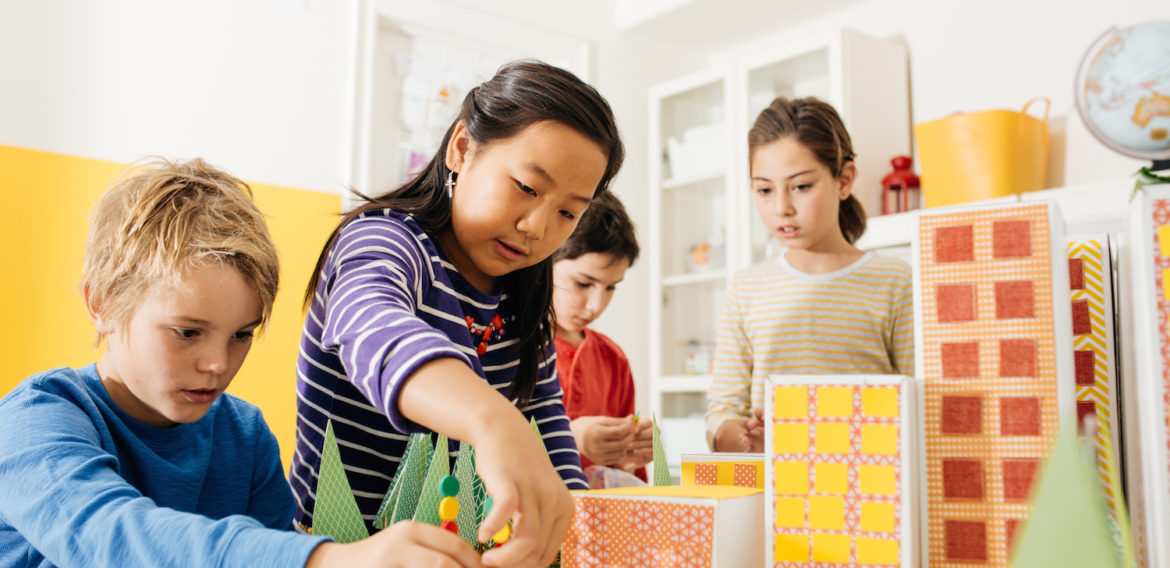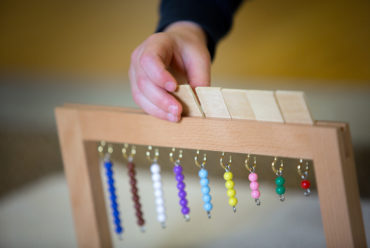Montessori Grit
by Aimee Allen
Many of us, in a quest for physical and mental fitness, in a desire to push ourselves through uncomfortable situations, and in pursuit of saying “I did it!” have taken to signing up for Spartan Races, Marathons, Warrior Dashes, Triathlons, Ragnar Relays, and 100 mile bike rides, etc. There is something about preparing to climb a 20 foot wall, looking up at it and thinking, “I can’t do this.”
Then a voice in your own head says, “Yes, you can,” and suddenly you are scrambling up that wall. These challenging events are temporary, yet for many people, they are pivotal. They are the culmination of training, hard work, practice and doing something outside of the comfortable norm. Certainly there are people who can do these events just because they have talent and fantastic genetics, but for most of us it takes perseverance and passion to get through them.
For many people there is a need to prove to themselves that they can do it. That’s a form of grit.
Grit is a buzz word that you have likely been hearing more and more, but not because of the growing Spartan Race industry. Grit is getting a lot of attention in 21st century schools and businesses. Companies want employees who don’t give up, work hard, think out of the box, and thrive on challenges. Grit is the combination of passion and perseverance. Grit is a term made famous by psychologist, researcher and author, Angela Duckworth. Duckworth has done extensive work studying success and achievement in various settings. She, like many others who study “soft skills,” believes that success and achievement are more about mindset than about talent. Last year, the Harbor Montessori School (HMS) staff studied the book Mindset by Carol Dweck. Dweck’s research showed again and again that those who believe intelligence is predetermined and unchanging are less likely to persist and achieve than those who believe intelligence is malleable. In the growth mindset, mistakes are embraced as learning practice, failure is seen as necessary, and hard work determines outcome.
Sometimes I look at the framed photo we have of Maria Montessori in the lobby, and I swear she is winking at me. I can practically hear her laughing while saying, “I could have told you that 110 years ago.” Once again, Dr. Montessori was ahead of her time. You want grit? Montessori’s got it.
In the Montessori classroom, at all age levels, the curriculum is designed with a control of error. This means students can make mistakes and then can fix them without an adult telling them they were wrong. There is no external judgment on their mistakes. Think of a jigsaw puzzle. You can tell when you have made a mistake, and then you can try again. You continue this until the puzzle is complete. You don’t wait for someone to come over and tell you that something isn’t a corner piece. You figure it out and keep going.
Montessori children expect to make mistakes and learn from them. They know from a very young age, that this is part of the learning process. Montessori children expect that some of the work they will do will take more time, be more challenging and produce varied results. Sometimes they do work that they think might be too difficult, and they stick with it and surprise themselves.
Let’s take the puzzle example a little further. This time the jigsaw puzzle is 1000 pieces. You are determined to finish it even though the odds are stacked against you. Maybe your cat is batting the loose pieces. Maybe your neighbor told you only boys are good at puzzles, or maybe everything comes easily to you, but this does not. For some reason, you are determined to finish that puzzle. It takes time, perseverance and passion, but you do it. In Montessori, we give children the time that they need to finish challenging work. We give students the space to focus on something that is meaningful to them and the encouragement to push themselves to complete it. We give children choice in what they do, but we make sure that they try things outside of their interest and comfort zone. Then we ask them to reflect on the experience. How did they feel when they completed something that took so much work and determination?
The key to a Montessori child’s success is intrinsic motivation. This is a desire to learn that stems from curiosity and not from outside rewards. The motivation comes from the pleasure of the task itself and/or the completion of the task. We can’t make children learn. We can’t bribe, threaten or beg them, but we can provide them with interesting opportunities and intentional work. When students become older, we teach them about their brains. We teach them about mindset, perseverance and challenging themselves. We share with them the “why,” but they still have to do the work. We can’t make a child have grit. We can only provide the opportunities, the time and the support.
There’s nothing new or trendy about grit. The best learning happens through passion, perseverance and meaningful education. Montessori students have been gritty since 1906. Maybe that can be our new T-shirt?










No Comments